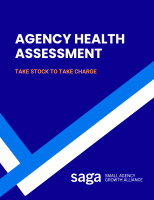As business owners, we sometimes need to think about unpleasant things. One of those is what happens if we get hit by a bus (literally or otherwise).
As we age, we see more businesses experience the sudden unexpected absence of its owner due to death, illness, or accident. Yet it is a phenomenon that no owner is immune from regardless of how many spins around the sun they have taken.
When I raise this topic with agency owners, I usually get a few affirmative head-nods, but when I check back with them later it remains on their to-do list.
Perhaps it is denial or maybe it is because they don’t know where to begin.
If it’s the latter, hopefully this article will help.
Consider the scenarios
There are four possible outcomes after you get hit by a bus. The first is that you bounce off like a superhero and nobody’s the wiser – until you start telling the tale of what could have been.
The rest require some planning.
Short-term unavailability. You might be knocked out of action unexpectedly for a few days or weeks. This temporary absence will be disruptive, but as long as you take care of a few important items in your planning, all should be well.
Long-term unavailability. If your sudden absence has no clear end date, things get blurrier. This is typically the trickiest scenario to plan for – but also the one that can have the biggest impact on the owner individually.
Death. If you haven’t figured it out already, this article isn’t really going to sugarcoat things. The reality is that owners do die unexpectedly and there ought to be a plan to provide for succession or an orderly unwinding of the business.
Good preparation can’t alleviate all of the pain of any of these situations, but it can certainly lead to better outcomes for all involved.
Start with access
If you do nothing else, make sure that someone else has access to all of your critical accounts and information.
Passwords
At a minimum, you need to make sure that somebody can access your relevant business logins. Whether that is someone who has shared access already or you have a system in place to share that information during a crisis, being able to login can make a huge difference.
Password managers can be a great tool for this since most agency owners are already storing their login information electronically. Most of the major solutions provide the ability to share with co-workers on an ongoing basis or grant a successor access if something happens to the account owner.
You can also go “old school” and have an envelope stored in a safe place with the relevant information. In fact, that’s what I did in one of my very first businesses. Key employees and partners knew that I had an envelope labeled “hit by a bus” that contained a few access codes that only I possessed – just in case.
Authorized contacts
While we primarily think about sharing access to online accounts, we also need to consider giving people the ability to act on our behalf with important providers.
Agency owners typically heavily restrict access to bank accounts – which is a good practice until you need someone to pay the bills when you can’t. Consider giving someone else signing authority on the checking account before it is a crisis.
Payroll and benefits providers often won’t talk to anyone who is not listed as an authorized contact, so try to avoid being the only name on any account. Getting that settled now will save a lot of headaches if something happens.
Temporary leadership
If you suddenly become unavailable, who will make decisions about the business?
It might be a longtime senior employee or a family member, but don’t leave it to them to sort it out if the time comes. Be clear about who should be making which decisions.
Naming that person isn’t where this ends, however. You need to make certain that they have the access as well as the information to step in if required.
Don’t assume that someone will be comfortable in this position. Let them know you are putting a plan in place that hopefully will never be used, but confirm that they are willing to handle whatever you plan to ask of them.
You also need to understand that if you have a prolonged absence, the person(s) that you place at the helm may need to make some significant decisions so you need to trust them to do so.
Communications
When it comes to this sort of doom-and-gloom planning, you need to think about effective communications.
Internal communications
This starts with making sure that at least one other person in your agency has the appropriate contact information to reach out and find out what is going on if you should suddenly disappear without explanation.
It sounds dramatic, but not knowing is often more damaging than if people know the truth.
If you make certain that your employees can reach family or friends who are likely to be familiar with what has happened, that can allow everyone to adapt appropriately.
External communications
Once your own team knows what’s up, it’s time to figure out how and when to make clients and other third parties aware.
These will be incredibly specific to the individual agency, but in general I would encourage more transparency rather than less. People have a tendency to make up facts to fill voids – and those imagined scenarios are frequently worse than reality.
Encourage whomever you have put in charge to be transparent, but also to be clear about what is unknown. A crisis of any kind – especially involving the business owner – introduces a fog that can take time to clear.
Insurance
Nobody likes insurance companies of any kind, but this sort of business planning wouldn’t be complete without a discussion about what you should be considering.
Life insurance
The first thing that comes to mind is usually life insurance. I’m not talking about your personal policy, but rather one that the business itself holds.
This sort of “key person” life insurance can make transitions smoother for the business. If you expect the business to continue operating after you are gone (either for someone who inherits your ownership or because it is a partnership) then you really ought to think about having this in place.
Proceeds from these policies owned by the business might be used to employ a replacement for the skills and services that you provided previously, but they can also be utilized to buy out your estate. That means that your heirs can benefit from the business you created without it dragging down the financial health of the agency in the process.
Disability insurance
As a business owner, you should also be thinking about how you make ends meet if you can’t work for a prolonged period of time.
That’s exactly what disability insurance exists to do and you should be carrying a policy that will enable you to focus on your own recovery without worrying about how your personal bills will get paid.
The less pressure on you personally, the more likely it is that the business will be able to move forward without your day-to-day involvement – and be there when and if you’re ready to return.
Special considerations for partnerships
All of the planning that has been discussed to this point benefits agencies of any structure. In many respects, things are much simpler for businesses with a single owner, however.
This may seem counterintuitive since you might believe that a partnership makes it easier to absorb these sorts of scenarios because there is already another owner (or more) in place to carry on.
However, the fact that there is now an owner who – temporarily or otherwise – cannot contribute economic value to the agency but still likely has a claim on profits complicates things considerably.
Legal documents
The first thing to do is to make sure that there is good paperwork in place for the partnership to handle the unexpected. That means you need to have a partnership operating agreement and a buy-sell agreement set up.
If you work with a good attorney, they will help walk you through the creation of these documents – not just to create a framework for the future but to help you communicate with the other partners about how things should be handled.
Partner communications and planning
As with many planning processes, the process often matters more than the final document.
Focusing on frequent and open communications among the agency’s partners with clearly defined roles will also help if the unexpected should rear its ugly head. So make sure that you are having regular partner meetings and well-defined job descriptions for each of you.
Partner compensation
You should have a clear plan for how (and how much) partners get compensated for the work that they do for the agency. Your accountant will tell you the best way to do this for tax purposes, but you should also be clear with each other about the total amount that you are getting as a worker versus how much you collect from the profits as an owner.
This matters in crisis planning because you should treat the compensation for work at least as well as how you would for any other employee facing a long-term absence, while the profit participation really shouldn’t change (unless you have agreed otherwise and it is legally permissible to do so).
Keep it simple
None of this planning needs to be complicated. You can’t plan for every possible scenario, so focus on getting the framework in place to help handle the unexpected.
It’s not fun to think about, but if the plan ever needs to be rolled out, you (and your partners and loved ones) will be glad you took the time to do it.










